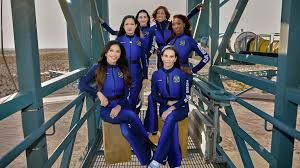WEST TEXAS — For eleven minutes on Sunday morning, six women soared above the Earth, floated weightless, and looked back at a planet quiet and blue. Then, in a cloud of dust and parachute silk, they came home.
It was a historic flight — Blue Origin’s first all-female crew — and it included some familiar faces. Pop star Katy Perry, broadcaster Gayle King, and Lauren Sánchez, fiancée of Amazon founder Jeff Bezos, were joined by former NASA engineer Aisha Bowe, civil rights activist Amanda Nguyen, and film producer Kerianne Flynn.
After touching down in the Texas desert, Sánchez, visibly emotional, said: “I looked out of the window and we got to see the moon. Earth looked so quiet. It wasn’t what I expected — it was quiet, but really alive.”
Katy Perry, ever the showwoman, stepped onto the ground, kissed the earth, and raised a daisy skyward — a nod to her daughter, Daisy. “I feel so connected to life,” she said. “And so connected to love.”
The launch, part of Blue Origin’s suborbital tourism programme, lifted off just after 8:30 a.m. local time. The rocket, named New Shepard, crossed the Kármán Line — the internationally recognised boundary of space — and gave the crew several minutes in microgravity before returning to Earth.
The capsule’s descent was controlled and cushioned by parachutes. Applause could be heard from inside as recovery teams approached.
“This is one of those experiences that’s hard to put into words,” said King, who admitted to struggling with air travel under normal circumstances. “I just want a moment with the ground,” she said, kneeling and kissing the desert floor.
The mission was brief but symbolic — a pointed gesture at representation in a field long dominated by men. The last time only women went into space was over six decades ago, when Soviet cosmonaut Valentina Tereshkova flew solo in 1963.
Still, not everyone was applauding.
Critics of space tourism — especially of its celebrity-driven variety — argue it’s little more than a joyride for the rich. “A celebrity isn’t an envoy of humankind,” said Dr Kai-Uwe Schrogl, a senior advisor at the European Space Agency. “They go into space for their own reasons. This gets more attention than real astronauts doing serious research.”
Online reactions were mixed. Some celebrated the crew as pioneers. Others dismissed the flight as tone-deaf. “Real Housewives go to Mars,” read one popular post.
Dr Tanya Harrison, a planetary scientist who worked on NASA Mars missions, called the flight “a marketing stunt,” but conceded, “this might shift public perception of who can go to space. That matters too.”
Gayle King responded to the criticism at a post-flight press conference. “People have no idea what’s actually going on here,” she said. “We’ve had such an incredible response from young girls. That matters.”
Sánchez added: “I’d invite anyone criticising us to come visit the Blue Origin team and see the passion, the precision. These missions are about more than headlines.”
Still, questions remain about the ethics of luxury space travel. Tickets on New Shepard reportedly cost upwards of $150,000 — a price tag that makes the experience inaccessible to most. Others have raised environmental concerns.
Blue Origin claims its engine only emits water vapour, but scientists warn that even water at high altitudes can disrupt the ozone layer and accelerate climate change.
“There’s a belief these flights are clean,” said Dr Eloise Marais, an atmospheric scientist at University College London. “But water vapour in the upper atmosphere alters the chemistry in ways we’re only beginning to understand.”
Yet supporters say private space companies are pushing boundaries once reserved for governments.
“Our civilisation needs to expand beyond Earth,” physicist Professor Brian Cox told the BBC. “Private innovation is playing a role in that.”
For now, though, the mission has sparked both inspiration and debate — a reminder that space, even as it becomes more accessible, remains a frontier in more ways than one.
As the dust settles on this short journey beyond Earth, Katy Perry’s words seem to sum up the moment best: “It was quiet up there, but I could feel everything.”
















